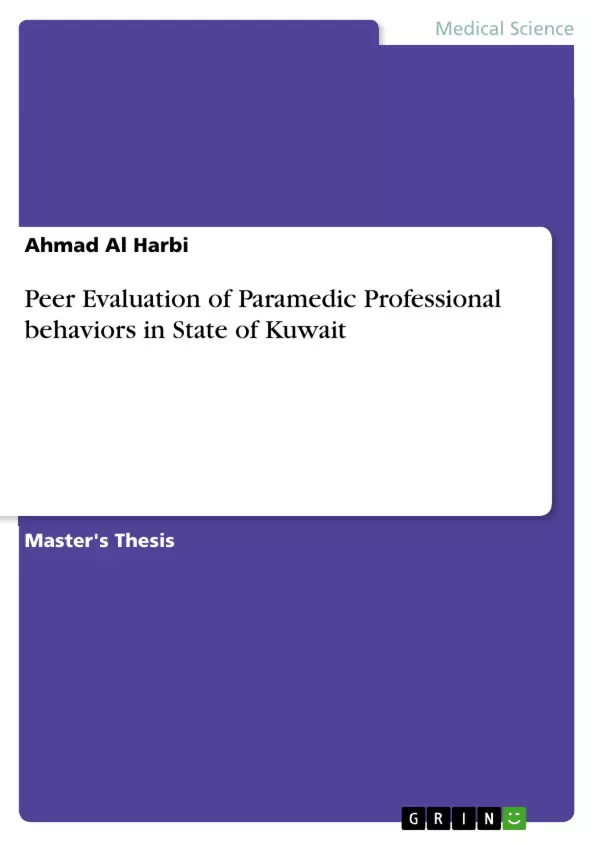Professionalism is the backbone of effective delivery of emergency medical services (EMS) practice, and is a component of the national standard curricula for advanced level of EMS education. The professional behavior of paramedics in Kuwait has never been evaluated. In this study peer evaluation has been used to assess these affective competencies of paramedics in Kuwait.
Focus group discussions were carried out at each of the six ambulance centers to get an insight into professionalism issues of paramedics. A professional behavior evaluation instrument developed by Brown et al (2005) was used to rate peers by paramedics of six Ambulance Districts in Kuwait. Paramedics with at least a diploma and one year field experience were asked to rate their paramedic partner with whom they have worked together in the past year on 11 categories of professional behavior using Likert scale. Variables such as nationality, educational qualifications, years of experience, marital status and ambulance centers were analysed.
Inhaltsverzeichnis (Table of Contents)
- Dedication
- Acknowledgment
- Abstract
- Chapter 1: Introduction
- 1.1 Background and Significance
- 1.2 The Concept of Professionalism
- 1.3 Professionalism in EMS
- 1.4 Professional Behaviors and Skills
- 1.5 Peer Evaluation: A Tool for Professional Development
- 1.6 Need for Research
- 1.7 Objectives of the Study
- Chapter 2: Literature Review
- 2.1 Professionalism in Healthcare
- 2.2 Professionalism in Pre-hospital Emergency Care
- 2.3 Peer Evaluation: A Powerful Tool for Professional Development
- Chapter 3: Methodology
- 3.1 Study Design
- 3.2 Participants
- 3.3 Data Collection Tools
- 3.4 Focus Group Discussion
- 3.5 Professional Behavior Evaluation Instrument
- 3.6 Data Analysis
- Chapter 4: Results
- 4.1 Focus Group Discussions
- 4.2 Quantitative Data Analysis
- Chapter 5: Discussion
- 5.1 Significance of the Study
- 5.2 Strengths and Limitations
- 5.3 Recommendations for Practice and Future Research
Zielsetzung und Themenschwerpunkte (Objectives and Key Themes)
This thesis explores the professional behaviors of paramedics in Kuwait. The research aims to assess the current state of professionalism within Kuwait's emergency medical services (EMS) system, using peer evaluation as a tool to measure affective competencies. The study seeks to identify areas where professional behaviors are lacking, exploring potential contributing factors, and ultimately provide recommendations for improvement. Key themes investigated in the thesis include: * **Professionalism in pre-hospital emergency care:** The study analyzes the importance of professionalism in EMS settings and its impact on the quality of patient care. * **Peer evaluation as a tool for professional development:** The research explores the effectiveness of peer evaluation in assessing and enhancing professional behaviors among paramedics. * **Factors influencing professional behaviors:** The study examines factors such as nationality, educational qualifications, experience, marital status, and ambulance center location to understand their influence on professional behaviors. * **Deficiencies in professional behavior training:** The thesis highlights the need for improved professional behavior training within the paramedic diploma curriculum. * **Recommendations for enhancing professionalism:** The study offers recommendations for enhancing the professional behaviors of paramedics in Kuwait, including suggestions for on-the-job training and curriculum development.Zusammenfassung der Kapitel (Chapter Summaries)
Chapter 1: Introduction provides a comprehensive overview of the study's background, significance, and objectives. The chapter introduces the concept of professionalism in healthcare, particularly within EMS, and discusses the role of professional behaviors and skills in delivering effective emergency medical care. The chapter highlights the importance of peer evaluation as a tool for professional development and explains the rationale behind conducting this study.
Chapter 2: Literature Review delves into existing research on professionalism in healthcare, with a focus on pre-hospital emergency care. The chapter examines the role of professionalism in delivering high-quality EMS services and explores the effectiveness of peer evaluation in fostering professional development among paramedics. The literature review provides a comprehensive overview of the theoretical framework underpinning the study.
Chapter 3: Methodology outlines the research design and methodology used in the study. It details the participant selection process, data collection methods, and data analysis techniques employed to gather and analyze information related to paramedic professional behaviors. The chapter also describes the focus group discussion procedure and the professional behavior evaluation instrument utilized for data collection.
Chapter 4: Results presents the findings of the study, encompassing both qualitative and quantitative data. The chapter analyzes the insights gleaned from the focus group discussions, exploring issues and perceptions regarding paramedic professionalism in Kuwait. It also presents the statistical analysis of data collected from the professional behavior evaluation instrument, highlighting the overall professional behavior scores, variations across different professional behavior categories, and the impact of various demographic and professional factors.
Schlüsselwörter (Keywords)
The primary keywords and focus topics of this research are: professionalism, pre-hospital emergency care, paramedics, peer evaluation, professional behaviors, EMS, Kuwait, healthcare, training, education, and quality of care.Frequently Asked Questions
How is professionalism evaluated among paramedics in Kuwait?
This study uses peer evaluation, where paramedics rate their partners on 11 categories of professional behavior using a Likert scale.
What are the key themes of paramedic professionalism in Kuwait?
Key themes include affective competencies, the impact of professionalism on patient care, and the effectiveness of peer evaluation for professional development.
Which factors influence the professional behavior of paramedics?
The research analyzes variables such as nationality, educational qualifications, years of experience, marital status, and specific ambulance centers.
What were the findings from the focus group discussions?
Focus groups provided insights into perceptions of professionalism and identified specific issues faced by paramedics in Kuwait's six ambulance districts.
What recommendations does the study provide for EMS education?
The thesis suggests improving professional behavior training within the paramedic diploma curriculum and implementing on-the-job training programs.
- Citation du texte
- Ahmad Al Harbi (Auteur), 2009, Peer Evaluation of Paramedic Professional behaviors in State of Kuwait, Munich, GRIN Verlag, https://www.grin.com/document/289180



